If you’ve noticed water leaking from your air conditioner, it’s important to take action quickly to prevent further damage. Leaks can be caused by various issues, including clogs, condensation, and seal damage. However, you can do a few easy things to fix the issue and prevent it from happening again.
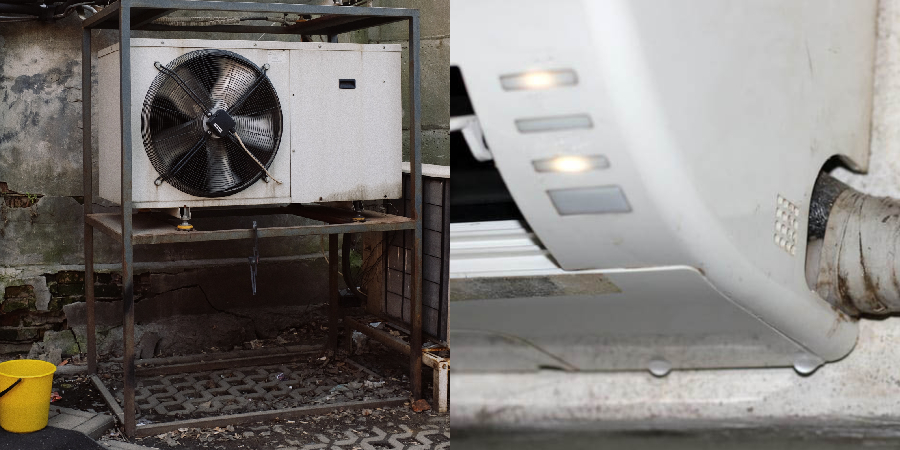
In this article, we’ll explain the causes of AC water leakage and outline some simple steps on how to fix air conditioner leaking water outside. We’ll also provide tips for preventing future leaks. So, if you’re dealing with an AC dripping water, keep reading for helpful advice.
Summary: If you’re noticing water leaking from your air conditioner, there are a few things you can do to fix the issue. Start by checking the seals around the unit. If they’re damaged or missing, replace them. Next, make sure the unit is properly sealed against the exterior. You can do this by using weather stripping or foam insulation. If these measures don’t work, then you may need to replace the air conditioner.
10 Reasons That Causes Air Conditioners to Leak Water
1. A Dirty Air Filter:
A clogged air filter can impede airflow and make your AC work overtime. This can cause condensation to build up, which may eventually start to leak. To prevent this, check your air filter regularly and replace it when necessary. If the air filter is extremely dirty, it may need to be replaced more frequently.
2. A Clogged Drain Line:
If your AC’s drain line becomes clogged, this can cause water to back up and start leaking from the unit. To clean a clogged drain line, you will need to flush it with a bleach solution. You can also try using a plunger to dislodge any blockages.
3. Improper Installation:
If your AC unit was not installed properly, this could lead to leaks. To avoid this, ensure that your AC unit is installed on a level surface and that all the connections are tight. You may need to hire a professional to fix any installation issues. If the problem persists, you may need to replace the entire unit.
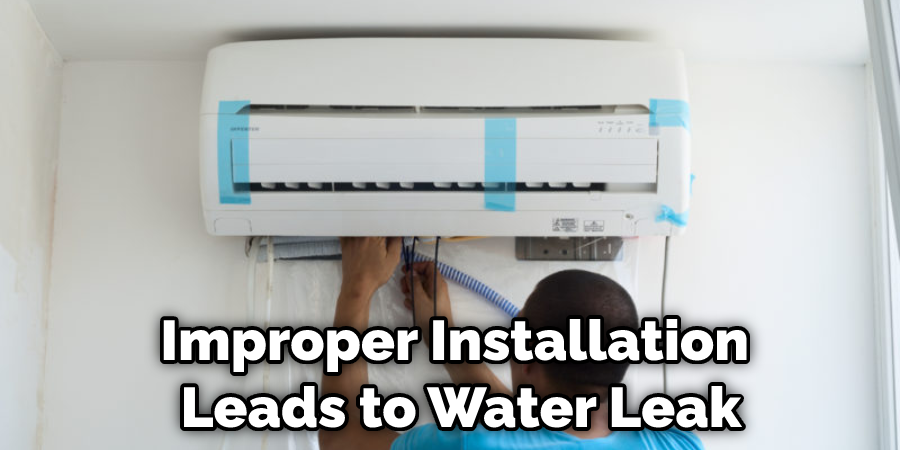
4. Refrigerant Leaks:
If your AC unit is leaking refrigerant, it may be low on refrigerant. Check the levels and add more if needed, following the instructions in your AC unit’s manual. If you’re not comfortable doing this, call a professional AC repair technician.
5. Frozen Evaporator Coils:
If your evaporator coils are frozen, water might leak from the unit. To thaw out the coils, first turn off the power to the unit. Then, take off the evaporator coil access panel and use a hair dryer set on low to thaw out the coils. Once the coils are thawed, turn the power back on and see if the leak has stopped. Be careful not to overheat the coils with the hair dryer, because this can damage them.
6. Worn-out Parts:
Over time, the parts in your AC unit can become worn out and fail. This can cause water to leak from the unit. To prevent this, be sure to have your AC unit regularly serviced by a professional technician. They will be able to spot any worn-out parts and replace them before they cause any problems. If you think the parts in your AC unit might be worn out, it’s best to call a professional for help.
7. Damaged Seals or Gaskets:
If your air conditioner leaks water from the unit itself, it could be due to damaged seals or gaskets. These components can degrade over time, especially if not properly maintained. If you suspect this is the case, you’ll need to contact a professional HVAC technician to inspect and replace the damaged parts. When replacing the seals or gaskets, use the correct type and size for your unit.
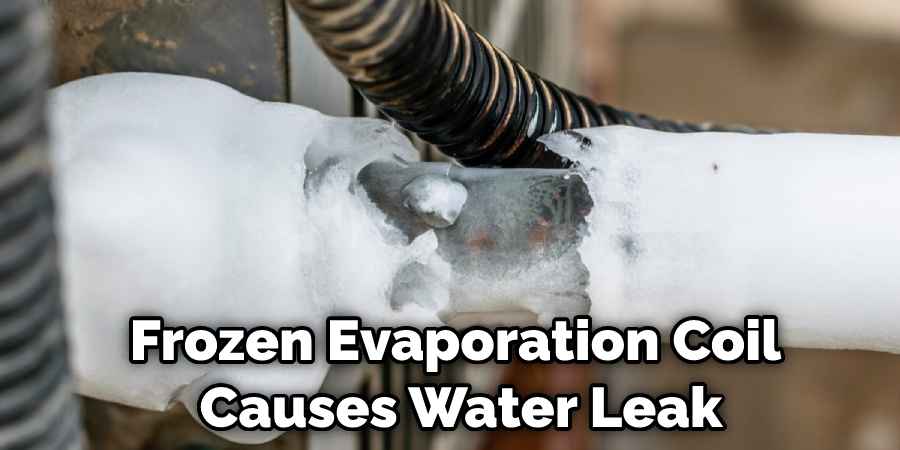
8. Insulation Pipe Issues:
If the insulation on your AC unit’s pipes is damaged, this can cause water to leak from the unit. To fix this, you’ll need to replace the damaged insulation. You can purchase replacement insulation at most hardware stores. Be sure to measure the thickness of the existing insulation to get an accurate replacement.
9. Airflow Issues:
If your AC leaks water inside or outside, it could be due to airflow issues. First, check to see any blockages around your unit, including the vents and coils. If you find any, clear them away and see if that solves the problem. When the airflow is restricted, it can cause the unit to work harder, leading to leaks. If the vents are clear but you’re still having issues, then it’s time to call in the professionals. It could be a clogged drain pan or line, which can lead to water leaks outside the unit.
10. Leaking Ductwork:
If your AC unit is leaking water, it could be due to leaks in the ductwork. To fix this, you’ll need to have the ductwork inspected and repaired by a professional. Otherwise, the leak will continue, and your AC unit won’t work properly. These are just a few potential causes of an AC unit leaking water. If you’re unsure of the cause, it’s best to contact a professional for help. They can diagnose the problem and recommend a course of action.
How to Fix Air Conditioner Leaking Water Outside: Step by Step Guide
Step 1: Check the Unit for Any Damage.
The first thing that you need to do is to check the unit for any damage. If there are any cracks or holes, then this is probably the reason why your air conditioner is leaking water outside. You will need to repair or replace damaged parts to stop the leak.
Step 2: Inspect the Drainage System.
Another possible reason for an air conditioner leaking water outside is a problem with the drainage system. If the drain pan is full or the drains are clogged, then this can cause water to leak out of the unit. Again, you will need to clean or replace the drainage system parts that are not working properly.
Step 3: Check for a Refrigerant Leak.
If your air conditioner is leaking refrigerant, then this can also cause water to leak from the unit. You’ll want to have a professional check for this problem and repair it as soon as possible. If there is a leak, the coolant level in your unit will be low, and it won’t be able to cool your home properly.
Step 4: Clear Debris from the Unit.
If debris is around or inside your air conditioner, this can also cause water to leak from the unit. Be sure to clear away any leaves, twigs, or other debris that may be blocking the unit. This will allow proper airflow and prevent water from building up and leaking out. When clearing debris, be careful not to damage the unit.
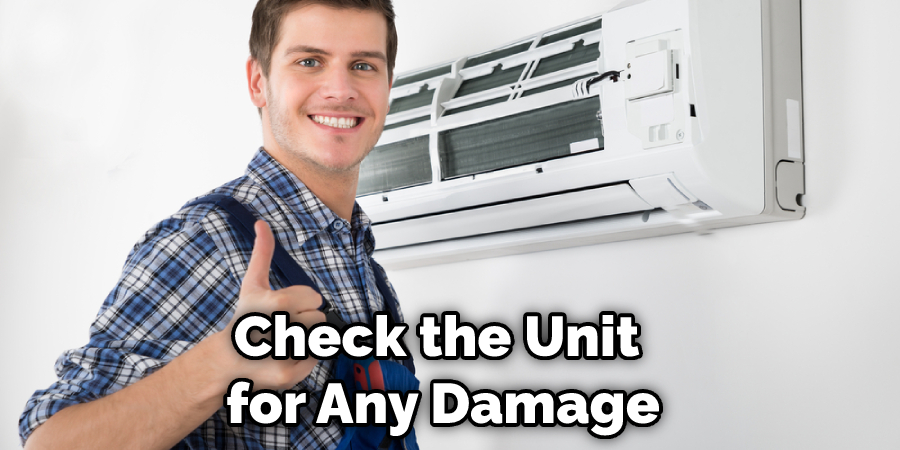
Step 5: Check the Drainage System.
If your air conditioner has a drainage system, this may cause the leak. The drainage system is responsible for carrying away excess water from the unit. If the system is blocked or damaged, water can build up and leak out. To check the drainage system, first, locate the drain line. This is usually a white PVC pipe that runs from the air conditioner to a nearby drain or sewer. Consult your air conditioner’s manual if you cannot find the drain line.
Step 6: Replace Damaged Parts.
If your air conditioner is leaking water due to a damaged part, you will need to replace that part. Common parts that can become damaged and cause leaks include the condensate drain line, the evaporator coils, and the blower motor. You should be able to find replacement parts at your local hardware store or online.
Step 7: Use a Dehumidifier:
If you live in a humid area, using a dehumidifier can help reduce the amount of water your air conditioner produces. Dehumidifiers remove moisture from the air, which can help reduce the amount of condensation that forms on your air conditioner coils. Be sure to empty the dehumidifier regularly, so it doesn’t overflow and cause water damage.
Step 8: Check for Leaks Regularly.
To prevent your air conditioner from leaking water, it’s important to check for leaks regularly. If you notice any leaks, fix them as soon as possible to prevent further damage. Checking for leaks regularly will also help you identify potential problems before they become serious.
You Can Check It Out To Fix a Refrigerant Leak in An Air Conditioner
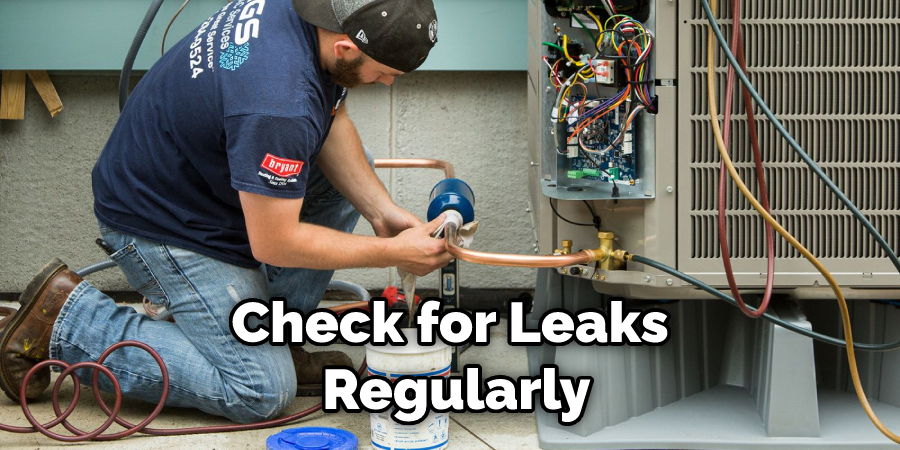
Few Helpful Tips to Prevent Leaks on Air Conditioners
- Check the unit regularly for any potential leaks.
- If you notice any leaking, immediately shut off the power to the unit and contact a professional for repairs.
- Make sure that the area around your air conditioner is clear of debris or other objects that could block proper drainage.
- Inspect the seals and gaskets around the unit regularly, and replace them if they show any signs of wear or damage.
- Keep the coils of your air conditioner clean and free of debris to allow for proper heat transfer and prevent condensation build-up
- If you have an outdoor air conditioner, ensure that the area around it is clear of vegetation or other objects that could obstruct airflow.
Frequently Asked Questions
Do I Stop My Air Conditioner From Leaking Water Outside?
There are a few things that you can do in order to minimize the potential of your air conditioner leaking water outside. The first thing is to check for any cracks or tears in the unit itself. If there are any, tighten them up as best as possible using a sealant or weather-stripping material. Additionally, inspect all fittings and pipes for signs of corrosion or damage. If necessary, replace these items altogether with new ones that are more leak-proof and secure.
Another way to reduce the risk of water leakage from your AC unit is by adjusting its settings appropriately during cold spells. Make sure that it is turned on at full capacity and set to cooling mode rather than fan mode when temperatures start dropping below 36°F (2°C). And finally, make sure not to overfill your tank with water – this may increase the chances of leaks occurring due to displacement pressure buildup inside the system.
Why is My Ac Dripping Water Outside?
There are a few potential causes for this issue, and the most common is mineral build-up in your Ac unit. This can be caused by high levels of moisture in the air or water that simply does not evaporate quickly enough. In addition, dirty filters can also cause mineral buildup. If you notice drips from your AC unit every time it’s turned on, then it might be best to have it serviced as soon as possible. Otherwise, try using a humidifier to add moisture to the air and help reduce water droplets from forming outside your Ac unit. There are a few potential causes for this issue, and the most common is mineral build-up in your Ac unit. This can be caused by high levels of moisture in the air or water that simply does not evaporate quickly enough. In addition, dirty filters can also cause mineral buildup. If you notice drips from your AC unit every time it’s turned on, then it might be best to have it serviced as soon as possible. Otherwise, try using a humidifier to add moisture to the air and help reduce water droplets from forming outside your Ac unit.
Should I Turn Off My Ac if It’s Leaking Water?
Depending on the severity of the leak and the type of water leak, turning off your ac may or may not be the best solution. In some cases, simply repairing the leak may be all that is required. However, in other cases, it may be necessary to replace the ac unit altogether.
whichever option you choose, make sure to consult a professional before making any decisions – they will be able to provide you with the best advice for your specific situation.
Can I Still Use My Ac if Its Leaking?
While it is generally a good idea to replace your air conditioning unit every 10-15 years, if you do not experience any leaks or noises, you may be able to continue using your AC for longer periods of time. If the air conditioner hasn’t been used for at least 6 months and there have been no leaks or problems with the unit itself, then experts usually recommend deferring from replacing it until later. However, in cases where there are signs of wear and tear (i.e., leakage or noise), then replacement is definitely needed sooner rather than later.
What Happens if Your Ac Drain Line is Clogged?
If your ac drain line is clogged, you may experience a number of issues. First and foremost, it can cause the ac to not work at all. This could be due to blockages in the lines or buildup on the filters. Second, if the system isn’t able to get rid of all of the accumulated debris quickly enough, this could lead to Mold growing inside the unit. And finally, it might release smells that are unpleasant and intoxicating- similar to those associated with Carbon Monoxide poisoning.
If you’re experiencing any problems with your ac unit, contact an Ac Installation Specialist as soon as possible for inspection and repairs if necessary.
Final Words
A clogged drain is the most common cause of an air conditioner leaking water. The unit’s condensation will leak out somewhere else when it can’t escape. Clear the drain line using a shop vac or hose to fix this. Be sure to check for any obstructions that may have caused the blockage in the first place.
If your AC continues to leak water after clearing the drain line, you may have a more serious problem on your hands and should call a technician. We hope this guide on how to fix air conditioner leaking water outside has been helpful! If you have any questions or want to know more, feel free to comment below!
You Can Check It Out to Fix Leaking AC Unit
